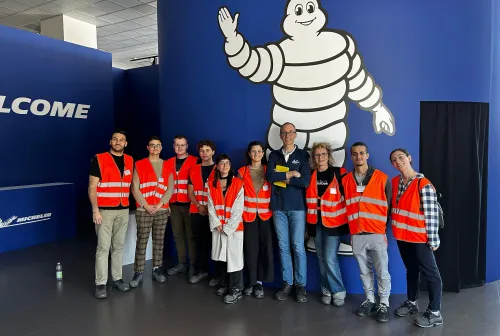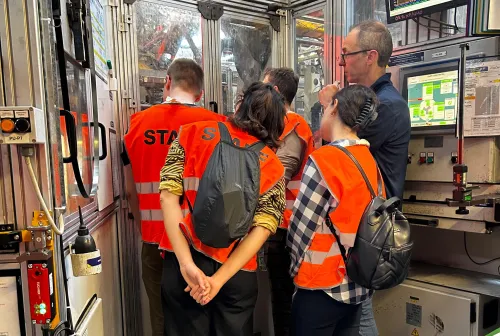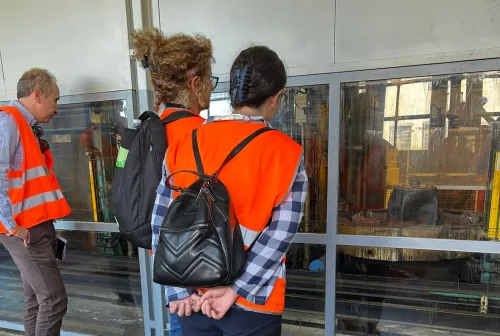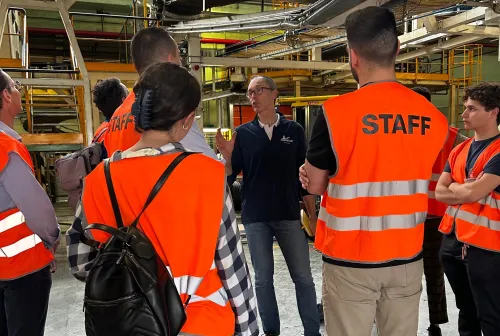Sustainable mobility and industrial innovation: the Students' Green Challenge concludes with a visit to the Michelin site in Cuneo

The third edition of the Students' Green Challenge, an initiative promoted by Spoke 2 of the NODES - North West Digital and Sustainable Ecosystem, in collaboration with the University of Turin and Michelin, ended with a visit to the Michelin production site in Cuneo. The event involved university students in a project and training course on the themes of sustainable mobility and the circular economy, culminating with a day inside one of Europe's most advanced industrial realities.
Michelin's Cuneo plant, located in the heart of Piedmont, is Europe's largest production facility for passenger car tyres. A production citadel where more than 2,300 people work every day to transform raw materials into high-performance products, within a supply chain that combines efficiency, sustainability and technological innovation.
From challenge to visit: a learning experience in the field
The Students' Green Challenge involved 30 participants in a three-week multidisciplinary challenge that began with a kick-off on 27 March 2025. During this course, the teams worked on concrete project proposals in collaboration with Michelin, addressing the issue of recovering and reusing industrial water in production processes, with the aim of reducing environmental impact.
The final Pitch Day saw the presentation of the solutions before a jury composed of representatives from Michelin, UniTo, NODES and the academic incubator 2i3T. One of the two winning teams was rewarded with a technical tour inside the Cuneo plant, in recognition of the quality of the proposal presented.

7 kilometres of technology and industrial knowledge
During the visit, the participants passed through more than 7 kilometres of facilities, The tour enabled them to observe the entire value chain: from the preparation of raw materials to the quality control of the finished product.
Many aspects related to materials and production processes were explored, crossing key concepts such as compounds, vulcanisation, chemical bonds, material ageing and quality control. Words such as natural and synthetic rubber, silicon, zinc oxide, waxes, antioxidants, peptides accompanied dense and stimulating explanations, conveying the complexity of a world in which each component plays a fundamental role in determining the quality, safety and sustainability of the final product.
The experience allowed many of the elements analysed during the challenge to be found in the field, such as the issue of condensate vapour recovery in production cycles: a challenge that is as much technical as strategic, recalling the importance of energy efficiency and operational sustainability in advanced industrial sites.

Performance, monitoring and sustainability
One of the key production processes was the vulcanisation phase, during which the compound is subjected to heat and pressure to stabilise its structure and achieve the desired mechanical characteristics. This is a key step to ensure elasticity, strength and safety of the final product.
Great attention is also paid to quality control, with punctual checks on tyre uniformity: among the parameters assessed are taper, false roundness and radial stiffness, which are essential to ensure stability on the road, reduced fuel consumption and driving comfort.
The visit offered a concrete overview of how each production phase is geared not only to efficiency, but also to the reduction of environmental impact, worker safety and the valorisation of resources. A direct testimony of the role that industry can and must play in the transition towards sustainable production models.
A challenge that leaves a mark
The project confirmed itself as a virtuous example of experiential training, where students were able to confront real challenges, develop technical skills, strengthen teamwork and gain a concrete vision of industrial dynamics. The synergy between university, business and the local area once again proves to be the key to training the professionals of the future.

